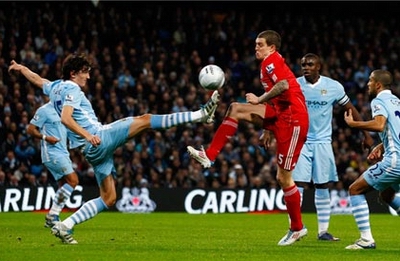
Researchers have called for much tighter government restrictions or even a ban on the marketing of alcohol during televised football matches, arguing that the messages are seen by and affect millions of children. Their research suggests football fans see around two references to alcoholic brands every minute when they watch a match on TV – in addition to the formal advertising during commercial breaks.
"The average spend on alcohol marketing in the UK was around £800m and yet only £200m was spent on traditional advertising, in terms of commercials," said Andy Graham, a public health specialist working for the NHS. "It's this ambient marketing that goes on – the viral campaigns, the social media and the sponsorship – which has more of an impact."
Jean Adams, a senior lecturer in public health at Newcastle University, who carried out the research with Graham, said that children in particular were affected by exposure to drinks brands on TV. "Children who don't drink, who are exposed to alcohol marketing, are more likely to start drinking earlier in their lives," she said. "And children who are already drinking are more likely to drink more after exposure to alcohol marketing."
Speaking on Tuesday at the British Science Festival in Newcastle, she said alcohol's prominence in football was an important issue because the sport was so popular in the UK and around the world. It is estimated that 46% of the world's population watched at least one minute of coverage of the World Cup final in South Africa in 2010. In the UK, more than a third of the UK population watched the World Cup final and more than 5 million 14-15-year-olds were exposed to TV alcohol marketing during the European championships last summer.
According to a recent report by researchers for Alcohol Health Alliance UK, every week 26% of men and 17% of women drink at hazardous levels in the UK. "The consequences of this level of population exposure in the UK include around 8,750 alcohol-related deaths per year, 1.2m alcohol-related hospital admissions (in England and Wales) and nearly 10,000 casualties of drink driving road traffic crashes," said the report.
In the football study, Graham watched more than 18 hours of football matches that had been shown on the BBC, ITV and Sky. They included the pre-match buildup, play itself and the post-match analysis of games from the Premier League, Champions League, FA Cup, League Cup, UEFA Cup and Championship. Graham noted every mention or view of an alcohol brand on screen, whether in the commentary, on billboards at the side of the pitch, on-screen logos before and after replays or when scores were shown or substitutions were being made.
The results, published on Wednesday in the journal Alcohol and Alcoholism, showed that in the six matches studied, there were 2,042 visual references to alcohol of various types, mostly beer. That was in addition to 32 verbal mentions of sponsors (primarily Carling in reference to the Carling Cup) and 17 adverts during the matches. "There were four references in commentary about the winning team likely to have hangovers in the morning," said Dr Adams, implying a strong relationship between drinking and success.
When the researchers looked at the amount of time dedicated to formal alcohol advertising, they found it accounted for less than 1% of the broadcast time. They said this reinforced the idea that alcohol manufacturers were using embedded marketing rather than advertising to get their messages across.
Self-regulation does exist to prevent alcohol manufacturers advertising in a way that might seem attractive to children, but this is not fit for purpose, said the researchers. "[Regulation] seems to me to focus on saying what sort of stories we can have in adverts but it does nothing to combat or reduce the constant bombardment that we're seeing of just very simple branding throughout the matches, that we know is harmful to our children," said Adams. The current regulation focuses on alcohol advertising and not on the embedded marketing they have identified, she added.
"Like tobacco, where we've had a widespread bunch of regulations restricting marketing and sponsorship and advertising, that needs to be considered for alcohol," said Adams.
Emily Robinson, director of campaigns at Alcohol Concern, said: "Young people tell us they're bombarded with alcohol adverts across traditional media like TV and increasingly the internet. Meanwhile the government has accepted that there is a link between alcohol advertising and consumption, particularly in those under 18 years old. If we're serious about protecting young people and encouraging them to make healthier choices we have to get tough on alcohol advertising and that means banning it from all sports events, including football."
A spokesman for the Portman Group, which represents the UK drinks industry, said: "National trends around alcohol consumption are encouraging. Government figures show that fewer and fewer children are even trying alcohol and the number of adults that drink to harmful levels is also falling. The drinks industry is committed to responsible marketing practices in all forms to help continue these positive national trends."





